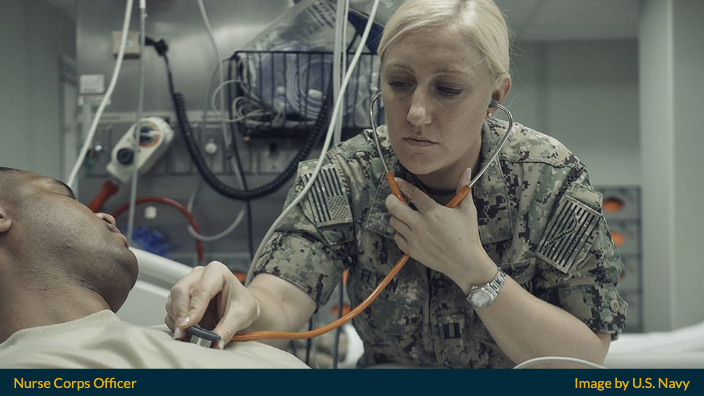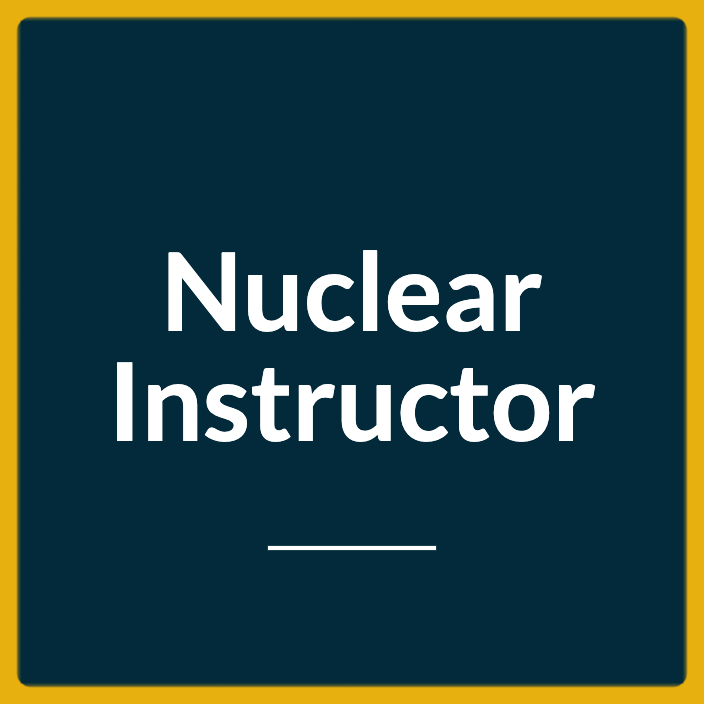Last Updated on November 16, 2023
This guide provides helpful information for those who are looking to become a Psychiatric Mental Health Nurse Practitioner (PMHNP) in the Navy during Fiscal Year 2024.
Specifically, we shall discuss the Navy scholarship program for civilian and military nurses to become a PMHNP through the Uniformed Services University of the Health Sciences graduate program.
There are many aspects and requirements involved in this process, but this robust financial assistance is worth investigating.
So, let us jump right in.
What Does a Psychiatric Nurse Practitioner Do in the Navy?
A Navy PMHNP is a Navy Nurse Corps Officer who assesses, diagnoses, and treats the mental health needs of military and civilian patients.

Many PMHNPs give counseling and medicines to people suffering from mental health diseases or drug misuse issues.
Psychiatric nurse practitioners may also conduct physical and psychological exams, evaluate treatment efficacy, and offer emergency psychiatric care in coordination with other healthcare providers.
Nurses interested in this Navy Nurse job should know most PMHNPs working in inpatient settings work standard hours with occasional night shifts when on call.
Outside of direct patient care, they also bear responsibilities expected of commissioned Nurse Corps officers in the Navy, such as leadership and administration.
How to Become a Navy Psychiatric Nurse Practitioner
Becoming a Navy psychiatric nurse practitioner involves two distinct layers of competition and selection.
First, applicants must have been accepted to the Psychiatric Mental Health Nurse Practitioner Doctoral Education Program at the Uniformed Services University of the Health Sciences (USU).
Second, applicants must compete for selection to become a commissioned officer in the Navy.
Below are the detailed requirements.
Admission Requirements for the Psychiatric Mental Health Nurse Practitioner Doctoral Education Program
Applicants must be a commissioned officer or service-sponsored civilian in the United States Army, Air Force, Navy, or Public Health Service with a Bachelor’s (or master’s degree with a Nursing focus) from an authorized institution.
Educational Requirements
- The USU application requires evidence-based writing
- Current curriculum vitae
- Current service-specific officer brief (e.g., SURF, ORB, OSR)
- Competitive GRE Scores
- Transcripts from all colleges and institutions attended, demonstrating:
- Undergraduate GPA of 3.0 or higher on a 4.0 scale
- Combined science GPA of 3.0 or higher on a 4.0 scale (chemistry, biochemistry, anatomy, physiology, etc.)
- Grade of 3.0 on a 4.0 scale or better in a scientific course from an authorized institution within the last 5 years
- Anatomy, physiology, combined anatomy and physiology, pathophysiology, or pharmacology are recommended, with graduate level courses preferable but courses at the 200-400 level accepted
- Statistics course from an accredited university within the last 5 years recommended (may be taken at the undergraduate or graduate level)
- Shadow a Mental Health nurse for at least 20 hours. If you need help, contact your chief nurse/senior nurse executive.
- Three letters of reference with unconditional admissions recommendations for the applicant from:
- Senior nurse executive/chief nurse (or another officer in immediate chain of command)
- APRN in the specialty for which you are applying
- Direct supervisor
What to Expect
There are no tuition or fees to pay. Students are required to do obligatory service under the standards of their sponsoring organization.
The first year of the curriculum focuses on fundamental advanced practice nursing science, evidence-based practice foundations, and foundational behavioral health material.
The simulation center clinical experiences will be incorporated into the first-year curriculum, so students will spend the bulk of their time on campus.
The second year expands on the first by focusing on evidence-based research, drug misuse, operational behavioral health, and pharmacologic and nonpharmacologic treatment modalities.
Beginning in the summer of the second year, didactic classes are reduced in length (usually 4-6 weeks) and are followed by extensive (9-10 week) clinical rotations, frequently at a TDY/TAD site.
Students move via Permanent Change of Station (PCS) to a selected clinical residency facility at the conclusion of the second year to finish the remaining didactic and clinical courses.
Follow this link to apply for the Graduate School of Nursing at the USU.
Requirements for Commissioning Through the Navy Psychiatric Nurse Practitioner Program
| Citizenship | Applicants must be citizens of the United States. |
| Age | Applicants must be commissioned in the Navy before reaching the age of 42. Waivers will be handled on an individual basis. |
| Education | A baccalaureate or advanced degree in nursing from a nursing school certified by the Accreditation Commission for Education in Nursing or the Commission on Collegiate Nursing Education. |
| Physical | Under NAVMED P-117 (MANMED), Chapter 15, and as specified in DoD Instruction 6130.03 (Medical Standards for Appointment, Enlistment, or Induction into the Military Services). |
| Clinical Experience | All candidates must have at least two years of experience as a licensed, baccalaureate-degree (or higher) Registered Nurse (RN) in the United States, its territories, or an overseas U.S. military or naval hospital. (Direct nursing care) |
| License | Applicants must have a current, unrestricted license to practice as a registered nurse granted by a state, territory, or commonwealth of the United States or the District of Columbia and must have passed the National Council Licensure Examination (NCLEX-RN). (RN license) |
All applicants must have applied and been admitted to the USUHS Psychiatric Mental Health Nurse Practitioner Doctoral Education Program. USUHS admission processes may be found at https://www.usuhs.edu.
Select “Admissions,” followed by “Graduate School of Nursing Admissions.” To apply, go to the website and download an online application.
The application, together with all relevant documentation, must be submitted by the 15th of August of the year before attendance. Transcripts and reference letters from universities should be sent to the applicant and not directly to the USUHS Graduate Education Office.
Waivers
If the candidate is beyond the age restriction for commissioning but has an extraordinary record or showed skill set necessary by the Navy, a waiver may be granted in restricted numbers.
When reviewing an age waiver request, specialties that are understaffed and have a history of unmet recruiting objectives will be prioritized.
Age exemptions for candidates aged 42 to 47 shall be reviewed and processed under OPNAVINST 1120.7A.
Who Can Apply to this Program?
The following may apply to the Navy Psychiatric Nurse Practitioner program:
a. Fully qualified civilians
b. Enlisted members from any branch of the armed services (Active or Reserve) if a suitable conditional release is granted and all program conditions are satisfied. Prior Navy enlisted members must provide a copy of their enlisted performance summary record, as well as three years of performance evaluations.
c. Commissioned personnel of any branch of the armed forces (Active or Reserve) who are not otherwise eligible for inter-service transfer or superseding appointment, provided the member’s service component approves conditional release (other services only) or contingent release (USN/USNR only) and all program requirements are met.
Service Obligation Upon Selection
Minimum active service term of three years from date of appointment The minimum time is concurrent with any active-duty commitment for military-sponsored education or training.
The remaining military service commitment, up to eight years, may be spent on a reserve component.
The receipt of special pay and bonuses, education obligations, and minimum activity tour requirements from joining the Navy as an active-duty officer may cause the obligation term to be extended.
Selectees must continue to complete all eligibility standards as provided in DoD Instruction 6000.13 while enrolled in the Navy PMHNP program at USU.
If a selectee cannot achieve these eligibility standards before or during the full-time PMHNP program, it will be deemed disqualifying, and the selectee may be withdrawn from the program at the discretion of the Director, Navy Nurse Corps.
Selectees also commit to serve on active-duty for three years for the first year of study and six months for each successive six months of study or part thereof.
Selectees who do not finish the program of study will serve as general nurses in the Navy Nurse Corps. The commitment will be in line with DoD Instruction 6000.13, with a three-year minimum requirement associated with this training.
More Information
If you want more information about becoming a Navy Psychiatric Nurse Practitioner, the next logical step is to contact a Naval Officer Recruiter.
Let us figure out how you can benefit from becoming a Navy Nurse—or if it is even the right career move for you.
Nursing students who are still in college should consider the Navy Nurse Candidate Program, which is another Navy scholarship that is designed for college students in nursing school.
Hope you find this useful in your career planning.


